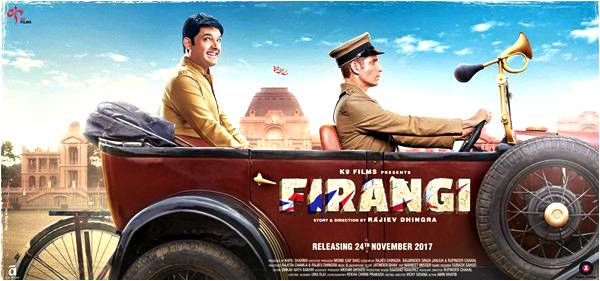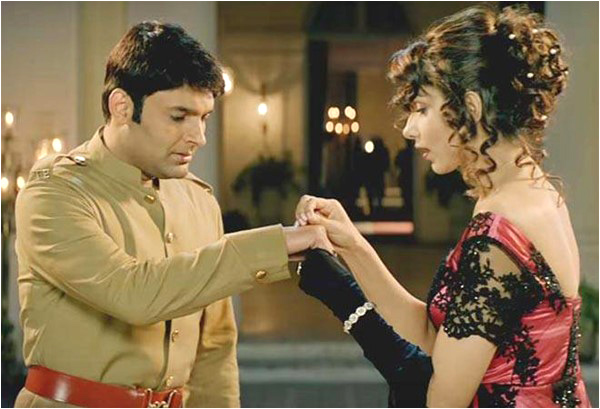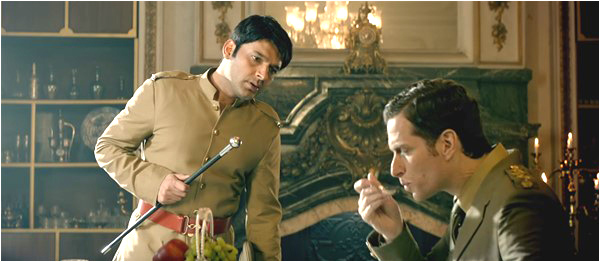
When you pay money to watch a film that stars Kapil Sharma in it, what you’re expecting at the very least is over two hours of rehashed versions of his jokes, some of which he has of course been ‘inspired by’.
The absolute worst-case scenario should be that the filmmakers don’t even bother with the remixing and rerun some of his best lines.
But after enduring two hours and 40 minutes of Firangi, the idea of any repeat of the Kapil Sharma Show seems like a ‘Very best of’ anthology.
For, not only does Firangi turn out to be a Kapil Sharma no-show, it actually is pretty much nothing of a movie. The film absolutely needlessly takes you back to the 1920s, incorporates the freedom fight, shoves in a love story and believes that a comic star is the best choice to bind that mess together.
The year is 1921. Memories of the Jallianwala Bagh massacre are still fresh and Mahatma Gandhi’s Non-Cooperation Movement against the British rule is about to peak.

In this backdrop, Behrampur village boy Manga (Kapil Sharma), the quintessential good-for-nothing man who should’ve long ceased to be a boy, is understandably struggling to garner respect from within and outside his family.
During wedding festivities at a neighbouring village Naku Guda, he falls in love with Sargi (Ishita Dutta), but his struggle for self-worth remains a hurdle. A chance encounter and his unparalleled ability to cure backaches lands him an orderly’s job with a British Police Officer Mark Daniel (Edward Sonnenblick).
Daniel, meanwhile, is planning the construction of a liquor factory with the Raja (Kumud Mishra), which would require the uprooting of Naku Guda. All this while Manga hopes that a high-profile job with the British would actually help him win over Sargi’s family, where the grandfather turns out to be an activist promoting Gandhi’s Non-Cooperation Movement.
Considering there are Punjabi villages – Kapil Sharma owes much, if not most, of his success to Inspector Shamsher Singh that won him the Laughter Challenge – and that there are condescending British everywhere to boost Kapil’s rural Punjabi forte, the premise looked like a winner.
That’s where the trailer deceives you. For, there is one small problem in what appears to be a foolproof plot to, at the very least, pull off a passable entertainer: the Kapil Sharma who the world knows is nowhere to be seen.
What we have instead is a version of him that tries too hard to become someone that he’s not. A version that takes his own counterfeit too seriously, perhaps in a bit to grow out of the mould that in his head might’ve limited his profile, despite simultaneously granting him superstardom.
That Kapil and his production manage to take down an impressive array of acting talent featuring Kumud Mishra, Rajesh Sharma, Inaam-ul-haq and Aanjjan Srivastav among others is a testament to just how big a shipwreck Firangi turns out to be.

Not only is the pre-Independence backdrop superfluous, it is actually counterproductive. A similar storyline based in modern day Punjab would’ve perhaps been more palatable – but it too would’ve needed a Shamsher Singh or an unapologetic and relentlessly hilarious ‘paindu’ version of Kapil Sharma to carry it to the finish line.
Firangi’s misplaced self-importance can be gauged by the fact that it’s Gandhi-ji himself that graces the climax scene, to give the final punch that fittingly smacks the film right on its confused face.
It is a tough job to look for a saving grace in this one, for it would manage to infuriate the history purists and the slapstick aficionados alike. Similarly, it won’t even catch the fancy of the British Empire’s perpetual critics.
More than the horrendous output, perhaps what is the most criminal is the fact that Rajiev Dhingra, a proven Punjabi director and Kapil Sharma, one of Punjab’s brightest lights in comedy, collectively conspired to conjure a failure that posed to have centered around all things Punjabi.
In similar cinematic catastrophes, one normally says that the fans of the lead star could perhaps risk, nay enjoy, the disaster. In this particular case, it is the Kapil Sharma buffs who should stay as far away from Firangi as possible – and perhaps watch Kis Kis ko Pyaar Karoon again, which as things stand, seems to be his magnum opus on the big screen.
The absolute worst-case scenario should be that the filmmakers don’t even bother with the remixing and rerun some of his best lines.
But after enduring two hours and 40 minutes of Firangi, the idea of any repeat of the Kapil Sharma Show seems like a ‘Very best of’ anthology.
For, not only does Firangi turn out to be a Kapil Sharma no-show, it actually is pretty much nothing of a movie. The film absolutely needlessly takes you back to the 1920s, incorporates the freedom fight, shoves in a love story and believes that a comic star is the best choice to bind that mess together.
The year is 1921. Memories of the Jallianwala Bagh massacre are still fresh and Mahatma Gandhi’s Non-Cooperation Movement against the British rule is about to peak.

In this backdrop, Behrampur village boy Manga (Kapil Sharma), the quintessential good-for-nothing man who should’ve long ceased to be a boy, is understandably struggling to garner respect from within and outside his family.
During wedding festivities at a neighbouring village Naku Guda, he falls in love with Sargi (Ishita Dutta), but his struggle for self-worth remains a hurdle. A chance encounter and his unparalleled ability to cure backaches lands him an orderly’s job with a British Police Officer Mark Daniel (Edward Sonnenblick).
Daniel, meanwhile, is planning the construction of a liquor factory with the Raja (Kumud Mishra), which would require the uprooting of Naku Guda. All this while Manga hopes that a high-profile job with the British would actually help him win over Sargi’s family, where the grandfather turns out to be an activist promoting Gandhi’s Non-Cooperation Movement.
The film absolutely needlessly takes you back to the 1920s, incorporates the freedom fight, shoves in a love story and believes that a comic star is the best choice to bind that mess together
Considering there are Punjabi villages – Kapil Sharma owes much, if not most, of his success to Inspector Shamsher Singh that won him the Laughter Challenge – and that there are condescending British everywhere to boost Kapil’s rural Punjabi forte, the premise looked like a winner.
That’s where the trailer deceives you. For, there is one small problem in what appears to be a foolproof plot to, at the very least, pull off a passable entertainer: the Kapil Sharma who the world knows is nowhere to be seen.
What we have instead is a version of him that tries too hard to become someone that he’s not. A version that takes his own counterfeit too seriously, perhaps in a bit to grow out of the mould that in his head might’ve limited his profile, despite simultaneously granting him superstardom.
That Kapil and his production manage to take down an impressive array of acting talent featuring Kumud Mishra, Rajesh Sharma, Inaam-ul-haq and Aanjjan Srivastav among others is a testament to just how big a shipwreck Firangi turns out to be.

Not only is the pre-Independence backdrop superfluous, it is actually counterproductive. A similar storyline based in modern day Punjab would’ve perhaps been more palatable – but it too would’ve needed a Shamsher Singh or an unapologetic and relentlessly hilarious ‘paindu’ version of Kapil Sharma to carry it to the finish line.
Firangi’s misplaced self-importance can be gauged by the fact that it’s Gandhi-ji himself that graces the climax scene, to give the final punch that fittingly smacks the film right on its confused face.
It is a tough job to look for a saving grace in this one, for it would manage to infuriate the history purists and the slapstick aficionados alike. Similarly, it won’t even catch the fancy of the British Empire’s perpetual critics.
More than the horrendous output, perhaps what is the most criminal is the fact that Rajiev Dhingra, a proven Punjabi director and Kapil Sharma, one of Punjab’s brightest lights in comedy, collectively conspired to conjure a failure that posed to have centered around all things Punjabi.
In similar cinematic catastrophes, one normally says that the fans of the lead star could perhaps risk, nay enjoy, the disaster. In this particular case, it is the Kapil Sharma buffs who should stay as far away from Firangi as possible – and perhaps watch Kis Kis ko Pyaar Karoon again, which as things stand, seems to be his magnum opus on the big screen.

